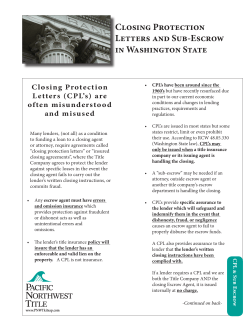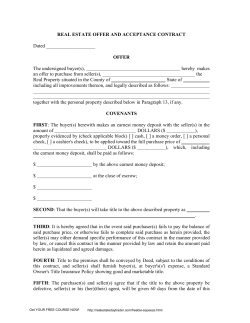
Standard term escrow agreements: the potential pitfalls for
in practice In Practice Reed Smith is a global relationship law firm, with more than 1,800 lawyers in 25 offices throughout Europe, the Middle East, Asia and the United States. Founded in 1877, the firm represents leading international businesses from FTSE 100 corporations to mid-market and emerging enterprises. Its lawyers provide litigation and other dispute resolution services in multi-jurisdictional and high-stake matters, deliver regulatory counsel, and execute the full range of strategic domestic and cross-border transactions. Reed Smith is a preeminent advisor to industries including financial services, life sciences, health care, energy and natural resources, advertising, technology and media, shipping, real estate, manufacturing, and education. For more information, visit reedsmith.com. Authors Kate Davies and Helena Nathanson Standard term escrow agreements: the potential pitfalls for depositors and agents alike Escrow agreements should be a relatively straightforward, stand-alone set of standard terms, right? Wrong. Reed Smith highlights some of the likely snags and pitfalls that you might encounter either if you intend to act as an Escrow Agent or when seeking to negotiate terms with an Escrow Agent. The moral of the story? When negotiating the underlying facility agreement, factor in sufficient time to negotiate and settle these ancilliary terms. n Escrows are where one party deposits funds (or a deed or other instrument) with an agent to be released to another party upon completion of a particular condition or event. They can be used widely, including in mergers and acquisitions (eg, indemnification or withholding part of the purchase price pending performance of the seller’s pre and post-completion obligations), property (eg, buyers’ deposits, leasehold improvement funds), inter-insurer disputes (eg, providing without prejudice funding to insureds where policy indemnity has been accepted in principle but primary and excess layers have an aggregation dispute) and lending (eg, where the lender wishes to monitor borrower performance and reduce risk). With lending, there are obvious benefits for both parties (the “Depositors”). The lender can monitor and reduce his counterparty risk; if the requisite release obligations are not satisfied or the loan defaults, he retains better prospects of recovering funds that are protected in a segregated account, and which has been administered by a neutral third party (the “Escrow Agent”) – than from a distressed borrower. Equally, the borrower has the comfort that the funds have been earmarked and will be made available to him upon satisfaction of certain pre-agreed conditions. So far, so good – at least, in principle. But, an escrow is only as valuable as the agreement governing its administration. Drafting the release and contingency provisions may not be straightforward, depending on the complexity of the underlying deal. The efficacy of an escrow can also be affected by the Escrow Agent selected. There is now a welcome trend for banks, rather than solicitors to provide third-party escrow products. They do not run into as many of the potential conflict issues that the solicitors instructed on an underlying deal will face, if the solicitor acts as Escrow Agent. Banks are also far better placed than solicitors to track the receipt and investment of funds, report on payments and interest accrued, execute investment instructions (particularly where multiple currencies and onshore/offshore and cross-border transactions are involved), liaise with loan administrators to monitor performance and turn around standard documentation. The disadvantage lies in their standard escrow terms. These will invariably need considerable input from the Depositors (as well as, increasingly, the Escrow Agent’s own legal Butterworths Journal of International Banking and Financial Law advisors), to ensure that the escrow terms mirror and respond to the underlying transaction as appropriate, given that the Escrow Agent is seldom, if ever, a party to the underlying finance documents. Timing becomes a real issue: ideally escrow terms should be considered and amended as close as possible to completion of the underlying facility documentation to give them the best prospects of catching all of the finalised, underlying terms. But this either leaves insufficient time for a fully considered and negotiated escrow agreement or leads to a frustrating, post-completion delay before performance – in some cases by several weeks. Alternatively the escrow terms may be addressed early in the process but will need to be constantly updated as the underlying transaction documentation is finalised. You may reduce post-completion delay, but risk the latest revised provisions not being carried through in their entirety to the escrow terms and inevitably the total amount spent on legal fees will spiral. Points to check when reviewing a standard term escrow agreement Depositors Choose your agent carefully: they should have appropriate expertise and resources to understand the underlying deal and administer the ancilliary escrow fund. Timing: factor in that your agent will need to carry out KYC checks. How soon after completion of the underlying documentation will you need the escrow fund to be operational? Negotiating escrow terms post-completion may take time. Certainty: set out the deposit terms, pre-conditions to draw down from the fund and the Escrow Agent’s duties in full. Do not just cross reference to the facility agreement. Scope: if there are ancilliary facilities/documentation, ensure that the fund and agent’s duties catch these and are not just limited to the main agreement. Segregated accounts v trusts: the Escrow Agent’s standard terms will almost certainly expressly state that escrow monies are not being held on trust. This is because the escrow funds will be held in a segregated account. However, there are different levels of segregation and it is usual for parties’ monies in an escrow fund to be commingled to some extent, given that the Escrow Agent is usually an institution providing similar services to others. For those reasons and depending on the parties involved, the Depositors’ previous experiences and the nature of the underlying deal, the Depositors may still insist that the Escrow Agent hold the cash expressly to the Depositors’ order. Where this is the case, the lenders will ideally require the borrower to declare itself as your trustee in respect of any right to receive escrow monies and October 2013 587 in practice In Practice Limit liabilities: check your duties and liabilities are limited to those arising out of specified, named agreements. Seek a cap on liability where appropriate. Seek E&O cover. Resist holding escrow funds on trust; rely instead on the standard market practice for this term to be excluded and on the segregated nature of the escrow fund providing sufficient protection. Certainty: as above. Uncertainty as to the terms for release of monies and your duties in the event of certain contingencies amount to scope for potential legal action. By ensuring the escrow agreement gives express instructions (for as many specified eventualities as possible) you protect yourself and your Depositor principals. Freedom to perform duties: ensure that events of default occurring under the facility agreement do not inhibit you from carrying out escrow duties or exercising remedies under the escrow agreement. Indemnities for third party costs incurred in administer ing the fund: eg, the costs of seeking legal advice on how to administer the escrow fund. n October 2013 Butterworths Journal of International Banking and Financial Law to hold all amounts received for your benefit up to the amount of principal (and interest) due under the underlying transaction. Conversely, borrowers should seek to ensure that any trust created for the benefit of the lender terminates automatically upon a valid release notice. Escrow Agent 588 Biog box Kate Davies is a senior associate in the Commercial Disputes Group, specialising in complex commercial disputes. Email: kdavies@reedsmith.com. Helena Nathanson is a partner in the Structured Finance Team, focusing heavily on restructuring, collateral protection and custodial arrangements. Email: hnathanson@reedsmith.com
© Copyright 2025

















